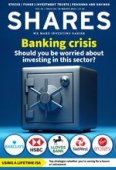Archived article
Please note that tax, investment, pension and ISA rules can change and the information and any views contained in this article may now be inaccurate.
Higher rates on cash savings could drive more generous dividends from shares

There is a powerful headwind for company directors and fund managers. It’s an issue causing all kinds of a stir behind closed doors.
I’m talking about how you can get more than 4% on cash without taking any investment risks. Even the one-year gilt (UK government bond) is yielding 4.1%. That’s very appealing for some people who can’t stomach the ups and downs of the stock market. These figures are in line with the equivalent rate of interest from the FTSE 100, currently yielding 4%.
Many people are now saying ‘why bother with equities?’ and that’s why company directors and fund managers are going to have to work harder to promote the benefits of buying shares or investing in an equity fund. Key to that argument will be greater focus on dividends.
Cash and gilts are deemed to be risk-free ways to make money whereas stocks and share-based funds come with the risk of your investment going down in value as well as up. Over the long-term, history has shown us that shares do best.
Why should someone take the risk now? The key argument is that a share or share-based fund can provide capital growth and income growth – something you won’t get with cash. The market decides whether a share price goes up or down, and that’s influenced by company success and external factors including sentiment, economics and politics. But the income portion is controlled by management deciding how much spare cash they can afford to return to shareholders.
I believe we could see companies become more generous with dividends to make their shares more appealing against cash. That in turn gives an asset manager holding these shares a better story by which to market their funds.
We’ve seen small caps go down the dividend carrot route in the past, such as when the commodity sector was in a decline and miners needed to attract investors so they started paying out more cash to shareholders. This time round, mid and large caps could be the areas of focus and we’ve already seen signs of more generous dividends over the past few months.
One might ask if a backdrop of high inflation and uncertain economic conditions is the time for companies to start paying out more cash.
David Cumming, head of UK equities at Newton Investment Management, argues that in some cases such as the banking sector, they can easily afford to pay out more dividends. He also sees little risk of companies over-distributing, which was the case pre-Covid in areas like oil and gas.
‘The good thing about the UK market is that the cover ratio is about 50%. The free cash flow yield is about 7% to 8%, and you’ve got a 4% yield so you’re two times covered. So, the quality of the dividend cover is quite good at the moment.
‘Having stable dividends and a decent yield in an environment where you’ve got a bit more uncertainty, a bit less growth and a higher cost of debt, then those dynamics become a bit more attractive.’
While more dividends are good news for investors, just watch out for any company that is ratcheting up payments to shareholders while also juggling large debts and avoiding investment in its business. Getting more cash today is good but never at the cost of letting the business suffer.
Important information:
These articles are provided by Shares magazine which is published by AJ Bell Media, a part of AJ Bell. Shares is not written by AJ Bell.
Shares is provided for your general information and use and is not a personal recommendation to invest. It is not intended to be relied upon by you in making or not making any investment decisions. The investments referred to in these articles will not be suitable for all investors. If in doubt please seek appropriate independent financial advice.
Investors acting on the information in these articles do so at their own risk and AJ Bell Media and its staff do not accept liability for losses suffered by investors as a result of their investment decisions.
Issue contents
Feature
- Investing in AIM shares for inheritance tax relief? Don’t get caught out by these issues
- Are Harbour Energy and its rivals bluffing about leaving the North Sea behind?
- Why investing in your 60s doesn't mean the end of investing for capital growth
- Lifetime ISA: top investment strategies for your first home or retirement
- How investors can take part in company fundraisings as they dial up again
 magazine
magazine








